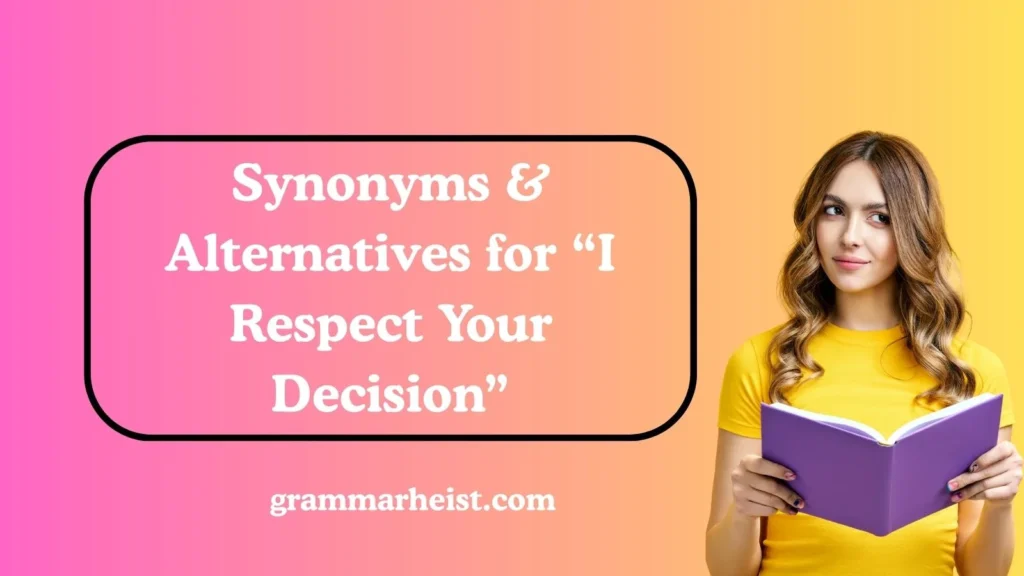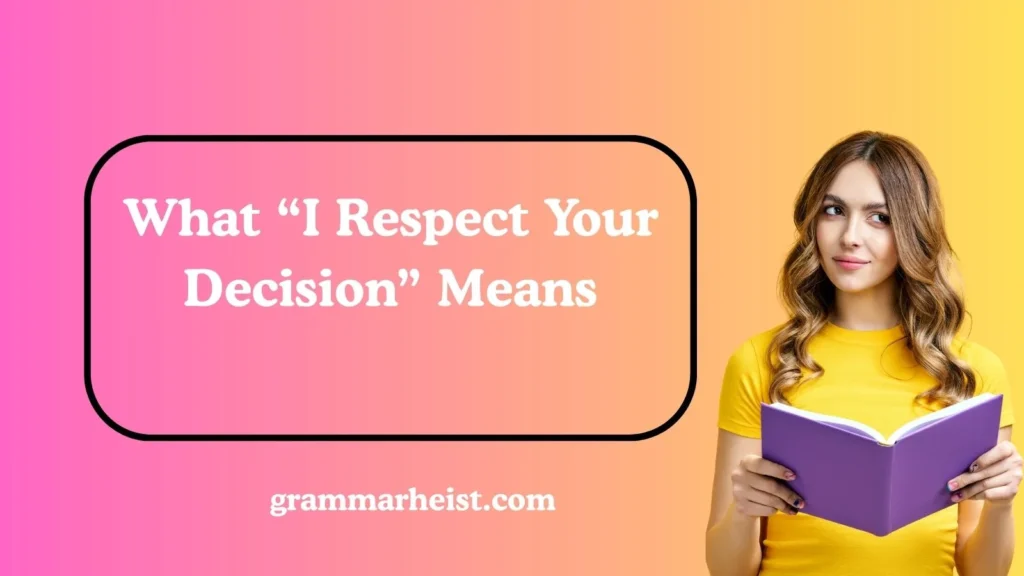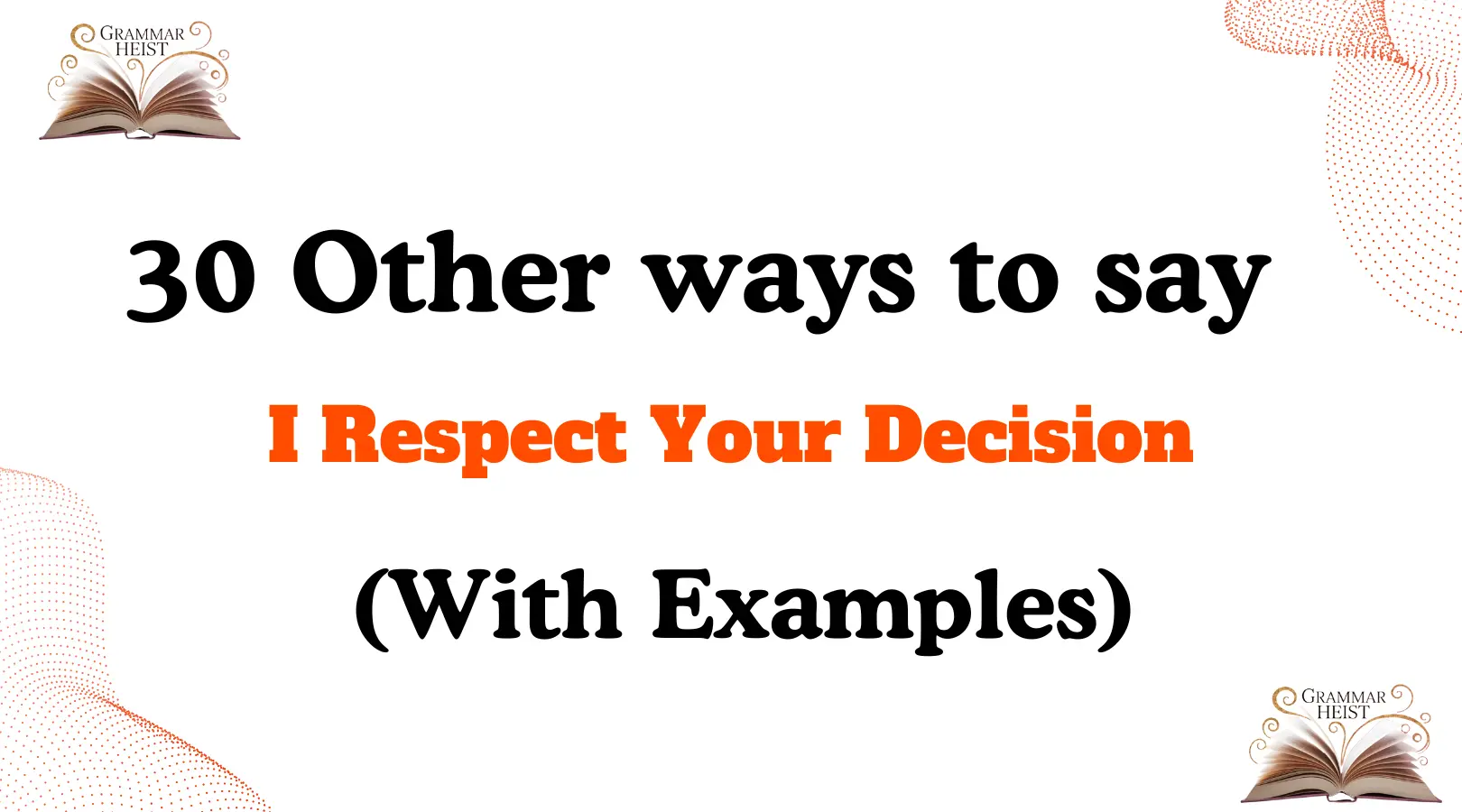Last Up date: 12-24-2025
Respecting someone’s decision is essential in fostering healthy relationships, whether personal or professional. It’s crucial to express understanding and acceptance in a way that makes the other person feel valued and heard.
Instead of simply saying, “I respect your decision,” there are many alternative ways to communicate this sentiment. This list of 30 thoughtful alternatives will help you convey empathy, appreciation, and support, while maintaining an authentic connection. Let’s dive into these alternatives that go beyond the standard phrase.
Quick Summary
This content emphasizes the importance of respecting someone’s decision to build healthy personal and professional relationships. Using thoughtful alternatives instead of the phrase “I respect your decision” helps express understanding, empathy, and support in a more authentic way. Choosing the right words makes others feel valued, heard, and appreciated, strengthening connections while maintaining respectful communication.
Is It Professional/Polite to Say “I Respect Your Decision”?

Saying “I respect your decision” is common and polite, but in some situations, you might want to use a more nuanced expression. It’s professional and acknowledges someone’s autonomy, but it may sound a bit impersonal in certain contexts. By using different alternatives, you can convey the same message with added warmth and understanding.
Pros and Cons
Pros:
- Clear acknowledgment of the other person’s autonomy.
- Works well in both professional and personal settings.
- Easy to say, and it shows respect.
Cons:
- Can sound formulaic or overly formal.
- Sometimes lacks emotional depth or connection.
- Might not fully convey support or understanding.
Ways to Say “I Respect Your Decision”

- A phrase used to acknowledge and honor someone’s choice, even if you don’t fully agree.
- Shows maturity, empathy, and emotional intelligence.
- Communicates acceptance without argument.
- Builds trust in both personal and professional conversations.
- Helps maintain peace and positive relationships.
Synonyms & Alternatives for “I Respect Your Decision”

- “I understand your choice.”
- “I’ll support what you decide.”
- “I value your perspective.”
- “Your decision is important to me.”
- “I accept what you’ve decided.”
How to Say It in Different Ways

- Formal: “I acknowledge and respect your decision.”
- Casual: “I get it, and I respect your choice.”
- Supportive: “I’ll stand by what you’ve chosen.”
- Neutral: “I understand and accept your decision.”
- Empathetic: “I know it wasn’t easy, but I respect your call.”
Professional Ways to Say “I Respect Your Decision”

- “I acknowledge your decision and will proceed accordingly.”
- “I understand and will honor your choice.”
- “Your decision is clear, and I will respect it.”
- “I appreciate the clarity and will respect your direction.”
- “I’ll follow through based on your decision.”
What “I Respect Your Decision” Means

- It means you accept someone’s choice without judgment.
- It shows that you won’t argue or pressure them further.
- Reflects professionalism and courtesy in disagreements.
- Indicates emotional intelligence and understanding.
- Often used to close a discussion politely.
How to Respond to “I Respect Your Decision”

- “Thank you, I appreciate that.”
- “I’m glad you understand.”
- “Thanks for respecting my choice.”
- “I value your support.”
- “I appreciate your understanding.”
Synonyms For I Respect Your Decision

- I Understand Your Choice
- I Appreciate Your Decision
- I Support Your Decision
- I Respect Your Judgment
- I Acknowledge Your Decision
- I See Why You Chose That
- I’m Behind You on This
- I Trust Your Decision
- I Can See Where You’re Coming From
- That Makes Sense to Me
- I Can Appreciate Your Decision
- I Recognize Your Decision
- You’ve Made a Thoughtful Choice
- You Have My Full Support
- I’m With You on This
- I Honor Your Decision
- I Value Your Decision
- I Respect Your Choice
- I Defer to Your Judgment
- I Admire Your Decision
- You Have My Respect for That Decision
- I Appreciate Your Perspective
- I Acknowledge and Accept Your Decision
- That’s Your Call, and I Respect It
- I Respect and Trust Your Decision
- Your Decision Deserves Respect
- You Have Every Right to Make That Decision
- I Respect Your Right to Choose
- I Accept Your Choice with Full Respect
- I Stand by Your Decision
1. “I Understand Your Choice”

Scenario: When you want to convey that you see where they are coming from.
Examples:
- I understand your choice and I’m glad you’re doing what feels best for you.
- “I understand your choice; it makes sense given the circumstances.”
- “I understand your decision, and I’m here to support you.”
Tone: Empathetic, supportive.
Explanation: This phrase communicates a deeper level of understanding, not just respect, but also empathy for the other person’s perspective.
2. “I Appreciate Your Decision”
Scenario: When you want to acknowledge that their decision has value.
Examples:
- “I appreciate your decision and the thought that went into it.”
- “I appreciate that you’ve made a choice that aligns with your values.”
- “I appreciate your decision; it shows strength and clarity.”
Tone: Grateful, appreciative.
Explanation: “Appreciate” conveys a sense of gratitude and admiration for the decision-making process.
3. “I Support Your Decision”
Scenario: When you want to express that you stand behind them.
Examples:
- “I support your decision and will be here for you no matter what.”
- “I support you, and I believe you made the right call.”
- “I support your decision, and I’m confident it’s the right one for you.”
Tone: Affirming, encouraging.
Explanation: This phrase shows that you fully back their decision, indicating loyalty and encouragement.
4. “I Respect Your Judgment”
Scenario: When you want to highlight the other person’s ability to make decisions.
Examples:
- “I respect your judgment, and I trust that you know what’s best for you.”
- “I respect your judgment in this matter.”
- “Your judgment is something I truly value and respect.”
Tone: Respectful, admiring.
Explanation: This phrase highlights your belief in their decision-making skills, giving them more credit for their thought process.
5. “I Acknowledge Your Decision”
Scenario: When you want to recognize the decision and the process behind it.
Examples:
- “I acknowledge your decision and the reasons behind it.”
- “I acknowledge that you’ve made a thoughtful decision.”
- “I acknowledge your decision, and I respect where you’re coming from.”
Tone: Respectful, understanding.
Explanation: “Acknowledge” adds an element of recognition and highlights that you’re aware of the thoughtfulness behind the decision.
6. “I See Why You Chose That”
Scenario: When you want to express that you understand their reasoning.
Examples:
- “I see why you chose that path; it makes perfect sense.”
- “I see why you made that decision, and I completely get it.”
- “I see why you chose that, and I respect the thought you put into it.”
Tone: Understanding, validating.
Explanation: This phrase shows that you’re acknowledging both the decision and the reasoning behind it, showing empathy.
7. “I’m Behind You on This”
Scenario: When you want to express full support and solidarity.
Examples:
- “I’m behind you on this decision and fully support it.”
- “I’m behind you on this choice, and I’ll stand by it.”
- “No matter what, I’m behind you on your decision.”
Tone: Supportive, reassuring.
Explanation: This phrase communicates that you are emotionally and practically supporting them, indicating trust and loyalty.
8. “I Trust Your Decision”
Scenario: When you want to express confidence in their judgment.
Examples:
- I trust your decision and I know you’ve thought it through carefully.
- “I trust your judgment and know you’re doing what’s best.”
- “I trust you completely with your decision.”
Tone: Confident, supportive.
Explanation: “Trust” shows confidence in their ability to make the right call, reinforcing their independence and decision-making capacity.
9. “I Can See Where You’re Coming From”
Scenario: When you want to empathize with the decision.
Examples:
- “I can see where you’re coming from, and I understand why you made that choice.”
- “I can see where you’re coming from; it’s a tough decision, but it makes sense.”
- “I can see where you’re coming from, and I respect your approach.”
Tone: Empathetic, understanding.
Explanation: This phrase helps convey empathy and shows that you recognize and validate their feelings behind the decision.
10. “That Makes Sense to Me”
Scenario: When you want to acknowledge that their decision is logical or rational.
Examples:
- “That makes sense to me, and I support your reasoning.”
- “That makes perfect sense, and I understand why you chose that route.”
- “That makes sense, and I respect the conclusion you’ve come to.”
Tone: Logical, validating.
Explanation: This phrase reassures the person that their decision is rational and understandable, showing that you value their reasoning.
11. “I Can Appreciate Your Decision”
Scenario: When you want to show that you value their perspective, even if you don’t fully agree.
Examples:
- “I can appreciate your decision, even though it’s a difficult one.”
- “I can appreciate where you’re coming from with that decision.”
- “I can appreciate your decision and the challenges that led to it.”
Tone: Appreciative, thoughtful.
Explanation: This phrase conveys that you acknowledge their decision, even if it differs from your own views, which shows respect for their individuality.
12. “I Recognize Your Decision”
Scenario: When you want to acknowledge the importance of their decision.
Examples:
- “I recognize your decision and understand the weight it carries.”
- “I recognize the choice you’ve made, and I respect it.”
- “I recognize the decision you’ve made, and I stand by it.”
Tone: Formal, respectful.
Explanation: “Recognize” suggests you fully see and appreciate the significance of their decision.
13. “You’ve Made a Thoughtful Choice”
Scenario: When you want to highlight the careful consideration behind their decision.
Examples:
- “You’ve made a thoughtful choice, and I respect that.”
- “It’s clear you’ve made a thoughtful decision, and I support it.”
- “I can see that you’ve given this decision a lot of thought, and I respect it.”
Tone: Appreciative, admiring.
Explanation: This phrase emphasizes the depth of thought and effort behind the decision.
14. “You Have My Full Support”
Scenario: When you want to give an unwavering expression of support.
Examples:
- “You have my full support, no matter what decision you make.”
- “You have my full support on this, and I trust it’s the right choice for you.”
- “I’m here to support you in whatever you decide, you have my full support.”
Tone: Supportive, reassuring.
Explanation: This phrase shows absolute support and confidence in their decision.
15. “I’m With You on This”
Scenario: When you want to show solidarity.
Examples:
- “I’m with you on this decision, and I believe in you.”
- “I’m with you on this choice, and I’ll stand by it.”
- “I’m with you, and I support your decision completely.”
Tone: Supportive, encouraging.
Explanation: A reassuring expression showing that you are on their side.
16. “I Honor Your Decision”
Scenario: When you want to express deep respect for their choice.
Examples:
- “I honor your decision and admire your strength in making it.”
- “I honor your choice and trust that you know what’s best for you.”
- “Your decision is yours to make, and I fully honor it.”
Tone: Respectful, formal.
Explanation: “Honor” adds a deeper sense of reverence, making it especially powerful in personal or serious discussions.
17. “I Value Your Decision”
Scenario: When you want to emphasize that their choice holds importance.
Examples:
- “I value your decision and the effort you put into making it.”
- “I value the thoughtfulness behind your choice.”
- “Your decision is important, and I truly value it.”
Tone: Appreciative, thoughtful.
Explanation: This phrase conveys that you see their decision as meaningful and well-considered.
18. “I Respect Your Choice”
Scenario: A simple yet effective way to express respect.
Examples:
- “I respect your choice and support you completely.”
- “It’s your choice, and I respect it.”
- “I respect your choice and trust you’ve made the right one for yourself.”
Tone: Neutral, professional.
Explanation: This alternative keeps things clear and direct while maintaining respect.
19. “I Defer to Your Judgment”
Scenario: When you want to show trust in their decision-making.
Examples:
- “I defer to your judgment because you know what’s best for you.”
- “I trust your call and defer to your expertise on this.”
- “You’ve thought this through, so I defer to your decision.”
Tone: Respectful, professional.
Explanation: This phrase works well when acknowledging someone’s expertise or personal agency.
20. “I Admire Your Decision”
Scenario: When you want to highlight their courage or wisdom.
Examples:
- “I admire your decision and the confidence behind it.”
- “It takes strength to make that choice, and I admire it.”
- “Your decision is admirable, and I respect it completely.”
Tone: Encouraging, appreciative.
Explanation: This adds an extra layer of admiration to your support.
21. “You Have My Respect for That Decision”
Scenario: When you want to emphasize your respect.
Examples:
- “You have my respect for making such a difficult decision.”
- “I may not fully understand, but you have my respect for choosing what’s right for you.”
- “That was a tough call, and you have my full respect for it.”
Tone: Supportive, serious.
Explanation: This alternative explicitly states your respect, making it feel more personal.
22. “I Appreciate Your Perspective”
Scenario: When you want to acknowledge their viewpoint.
Examples:
- “I appreciate your perspective, even if I see things differently.”
- “I appreciate your perspective and the reasons behind your decision.”
- “Your perspective matters, and I truly appreciate it.”
Tone: Thoughtful, validating.
Explanation: This is great for situations where you may not fully agree but still want to show respect.
23. “I Acknowledge and Accept Your Decision”
Scenario: When you want to reinforce both recognition and acceptance.
Examples:
- “I acknowledge and accept your decision, and I respect your right to make it.”
- “I acknowledge your choice, and I fully accept it.”
- “I see the reasoning behind your decision, and I acknowledge and accept it.”
Tone: Formal, supportive.
Explanation: This phrase adds an extra layer of acceptance, making it sound even more understanding.
24. “That’s Your Call, and I Respect It”
Scenario: When you want to give them full agency over their choice.
Examples:
- “That’s your call, and I respect whatever you decide.”
- “It’s your call, and I won’t question your decision.”
- “That’s your decision to make, and I respect your authority on it.”
Tone: Neutral, direct.
Explanation: This phrasing reinforces their autonomy while still showing respect.
25. “I Respect and Trust Your Decision”
Scenario: When you want to emphasize both respect and confidence in their choice.
Examples:
- “I respect and trust your decision completely.”
- “You know what’s best for you, and I respect and trust your judgment.”
- “I respect and trust the choice you’ve made.”
Tone: Reassuring, validating.
Explanation: By adding “trust,” you reinforce confidence in their ability to make the right decision.
26. “Your Decision Deserves Respect”
Scenario: When you want to emphasize that their choice is worthy of recognition.
Examples:
- “Your decision deserves respect, and I give you mine.”
- “That was not an easy choice, and it deserves full respect.”
- “Your decision-making process is thoughtful, and it deserves respect.”
Tone: Affirming, supportive.
Explanation: This phrase strengthens the idea that their choice is valid and worthy.
27. “You Have Every Right to Make That Decision”
Scenario: When you want to emphasize their autonomy.
Examples:
- “You have every right to make that decision, and I support you.”
- “It’s your choice to make, and I fully respect that.”
- “You have every right to decide what’s best for you.”
Tone: Empowering, affirming.
Explanation: This phrase reinforces the idea that they are in control of their own choices.
28. “I Respect Your Right to Choose”
Scenario: When you want to highlight their personal freedom.
Examples:
- “I respect your right to choose what works best for you.”
- “Your choices are yours to make, and I respect that right.”
- “Everyone deserves the freedom to choose, and I respect your decision.”
Tone: Validating, understanding.
Explanation: This works well in discussions about personal autonomy and independence.
29. “I Accept Your Choice with Full Respect”
Scenario: When you want to show both acceptance and deep respect.
Examples:
- “I accept your choice with full respect and understanding.”
- “I may not have made the same choice, but I accept it with full respect.”
- “Your decision is yours alone, and I accept it with full respect.”
Tone: Formal, respectful.
Explanation: This phrase is especially useful in professional or serious personal conversations.
30. “I Stand by Your Decision”
Scenario: When you want to express unwavering support.
Examples:
- “I stand by your decision and trust that you know what’s best.”
- “Your choice is yours to make, and I stand by it.”
- “I stand by your decision 100%.”
Tone: Strong, affirming.
Explanation: This phrase adds an extra level of support and solidarity.
FAQs:
What does it mean to respect someone’s decision?
Respecting someone’s decision means showing understanding, acceptance, and consideration, even if you don’t fully agree with their choice.
Why is it important to use alternative phrases instead of “I respect your decision”?
Using alternative expressions helps avoid repetition and allows you to communicate empathy and support in a more natural and personal way.
When should you express respect for someone’s decision?
You should express respect in both personal and professional situations, especially during discussions involving choices, boundaries, or important outcomes.
Can respectful wording strengthen professional relationships?
Yes, thoughtful and respectful language builds trust, encourages open communication, and strengthens long-term professional relationships.
How can tone affect how respect is received?
A warm, calm, and genuine tone ensures your message feels sincere, making the other person feel valued and heard.
Conclusion
When it comes to expressing respect for someone’s decision, the words you choose can make all the difference. Instead of relying on the generic “I respect your decision,” these thoughtful alternatives can add warmth, empathy, and deeper meaning to your message. Whether you’re offering support, understanding, or admiration, these phrases help foster a more personal and considerate connection.
By carefully selecting the right phrase for the situation, you show that you truly value the other person’s perspective and autonomy. Communication that reflects care and understanding can strengthen both personal and professional relationships, creating an environment of mutual respect and support.

Emma Rose is a dedicated writing expert with a passion for helping others enhance their communication skills. With a strong background in grammar, language structure, and style, Emma empowers individuals to write with clarity, confidence, and impact. Her approach combines a keen attention to detail with a supportive, personalized touch, ensuring each person she works with improves and grows in their writing journey.













